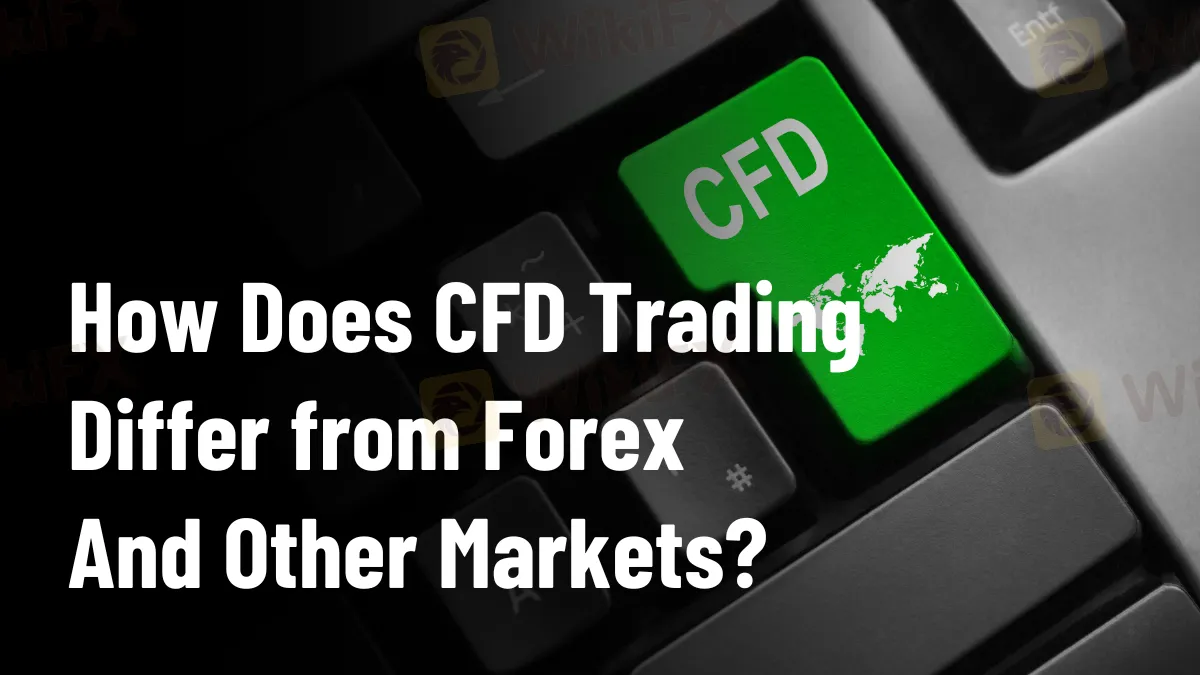简体中文
繁體中文
English
Pусский
日本語
ภาษาไทย
Tiếng Việt
Bahasa Indonesia
Español
हिन्दी
Filippiiniläinen
Français
Deutsch
Português
Türkçe
한국어
العربية
How Does CFD Trading Differ from Forex and Other Markets?
Abstract:Learn about CFD and Forex trading, their key differences, and the pros and cons of these trading instruments to enhance your strategies in the financial markets.

Contracts for Difference (CFDs) are a financial derivative that enables traders to bet on the price fluctuations of different financial assets without actually owning them. CFDs allow traders to contract with their broker to speculate on whether the price of a certain asset will increase or decrease. They will gain from the price difference between the starting and end dates if their prediction is correct. They will keep the same amount of money if their guess proves accurate.
This article describes CFD trading, how it differs from other popular trading instruments like Forex, and the advantages and disadvantages of this dynamic trading method. Understanding these distinctions is critical for traders seeking to traverse global financial markets' intricacies successfully.
What is CFD Trading?
The term “CFD” stands for “Contract for Difference.” CFD trading does not include the purchase or sale of a tangible asset. Instead, they anticipate the asset's future price movement. Essentially, it is an agreement between the trader and the broker to exchange the asset value difference between when the contract is opened and closed.
Adaptability is one of the most intriguing qualities of CFDs. CFDs allow traders to speculate on various asset classes, including stocks, indices, commodities like oil and gold, and even cryptocurrencies like Bitcoin. Because of their adaptability, CFDs are a popular choice for those who want to be open to more than just a particular asset or market.
Additionally, CFD trading enables traders to benefit from both rising and declining markets. If a trader feels an item's price will increase, they may take a “long” position, essentially owning the asset. If they believe the cost will decline, they may take a “short” position and sell the asset. The capacity to trade both ways improves flexibility and opportunity.
Key Distinctions Between CFD and Forex Trading
While CFD trading has parallels to other kinds of trading, it differs from Forex trading in key ways:
- Market Focus:
- CFD Trading: Gain access to a wide range of marketplaces. Individual equities, global indexes, commodities, and even cryptocurrency are all available for trading. This diversity appeals to traders searching for possibilities in various industries and countries.
- Forex Trading: Often known as foreign exchange trading, it is entirely focused on currency pairings. This market trades currencies like the euro, US dollar, Japanese yen, and British pound. Forex traders often focus on the economic and geopolitical variables influencing currency prices, but CFD traders may consider a wider variety of market forces.
- Leverage:
- CFD Trading: Enabling traders to handle greater positions than their original investment. However, the degree of leverage supplied might vary depending on the traded item and the broker's unique conditions. While leverage may boost earnings, it also raises the possibility of higher losses, necessitating careful risk management.
- Forex Trading: Forex trading, like CFDs, is highly leveraged. Leverage in Forex may often be more significant than in CFD trading, with some firms providing levels of up to 500:1. This implies that a trader with a modest investment may hold a significant market position. However, this also increases the potential for substantial losses, particularly in highly volatile currency markets.
- Contract Size:
- CFD Trading: One of the benefits of CFD trading is the ability to choose contract sizes. Traders may pick smaller holdings corresponding to their risk tolerance and capital availability. This flexibility enables more customized trading methods and makes CFDs accessible to traders of varied levels of expertise and money.
- Forex Trading often occurs in standardized lots. The primary lot size is 100,000 units of the base currency, with mini (10,000 units) and micro (1,000 units) lots also available. This structure may require a more significant capital investment, particularly given the flexibility of CFDs.
- Trading Hours:
- CFD Trading: The trading hours vary depending on the asset being traded. For example, CFDs on worldwide indices or commodities may be traded within specified market hours determined by their geographic location. However, several CFD brokers provide longer trading hours, allowing for practically continuous trading on the most important markets.
- Forex Trading is a decentralized market that runs continuously, five days a week. The market never sleeps because trading periods in various time zones overlap. This continuous trading environment caters to individuals looking for flexibility in trading hours, making it popular with full-time and part-time traders outside conventional business hours.
- Costs & Fees:
- CFD Trading: The spread is the difference between the broker's buy and sell prices. Furthermore, keeping a leveraged CFD position overnight often incurs finance costs, which may rise if positions are held open for a lengthy period of time.
- Forex Trading: Spreads and fees are the most common charges associated with Forex trading. Some brokers provide commission-free trading but compensate with higher spreads. Unlike CFDs, Forex traders do not pay overnight financing costs unless they are trading with leverage; in that case, comparable overnight fees may apply.

How CFDs are Different from Other Trading Instruments
CFDs differ from other types of trading products, such as stocks, options, and futures. Understanding these characteristics allows traders to identify which product suits their trading style and goals.
When purchasing individual stocks, traders get a stake in the firm, making them partial owners.
- Stocks:
- Stockholders have specific rights, such as voting at shareholder meetings and collecting dividends if the firm declares them. CFD traders, on the other hand, never hold the underlying asset; instead, they speculate on its price fluctuation.
- Dividends:
- Stockholders may profit from dividend payments, which are payouts of a part of a company's earnings. While CFD traders do not get actual dividends, brokers may alter the CFD price to reflect dividend distributions. However, this depends on the broker's regulations.
- Options:
- Expiration: Contracts, unlike CFDs, have an expiration date. This adds time to options trading, requiring traders to forecast the price change direction and timeframe. CFDs, on the other hand, do not have expiry dates, enabling traders to retain their positions for as long as they like, provided they can fund the related fees.
- Premium: Trading options require a premium to participate in the transaction. This premium is the cost of purchasing the right, but not the responsibility, to buy or sell an asset at a fixed price before the contract expires. CFDs do not need such premiums; traders pay the spread and any overnight costs incurred when using leverage.
- Futures:
- Contract Duration: Futures contracts, like options, have an expiry date. Futures are often used for hedging or speculative trading commodities, indices, and interest rates. CFDs, on the other hand, do not have expiry dates, providing traders with more flexibility. Futures are also often traded on exchanges, while CFDs are traded over the counter (OTC) by brokers.
- Liquidity: CFD marketplaces are more liquid than futures markets because they are available via brokers that provide a continuous trading market. While futures markets are very fluid in popular contracts, they may have restricted liquidity in less-traded assets, affecting the ability to enter or exit positions effectively.
Pros and Cons of CFD Trading
Like any other financial instrument, CFD trading has benefits and drawbacks that make it appropriate for specific traders but not for others.
- Advantages:
- Versatility: CFDs provide traders with access to various markets, including equities, commodities, indices, and cryptocurrencies, all from the same platform. This adaptability is appealing to individuals looking to vary their trading techniques across several asset classes.
- Leverage: In CFD trading, traders may manage more significant positions with relatively modest sums of money. If the market swings in the trader's favor, they may profit substantially.
- Profit in Rising and Falling Markets: CFD traders may trade long and short positions to benefit whether the market is moving upwards or downwards. This versatility makes CFDs a tempting choice in unpredictable markets.
- Disadvantages:
- High Risk: While leverage may increase earnings, it can also increase losses. Traders who do not properly manage risk might soon face serious financial problems if the market turns against them. Risk management methods such as stop-loss orders and position size must be used to limit this risk.
- Overnight costs: Holding leveraged CFD positions overnight incurs financing costs, which may cut into earnings, particularly for traders who leave positions open for long periods of time. These costs may rise over time, making CFD trading less cost-effective for long-term plans.
- No Ownership: Because CFD traders do not own the underlying asset, they do not benefit from ownership benefits such as dividends (in the case of stocks) or the security of having a physical item. Because of this absence of ownership, CFDs are better suited to short- to medium-term trading than long-term investing.
Finally, CFDs provide an excellent instrument for traders to access various markets with little initial investment. However, they are not risk-free, particularly given the high levels of leverage involved. Before considering whether CFD trading fits into their entire trading strategy, traders should carefully examine the benefits and drawbacks, as well as the distinctions between it and Forex and other trading instruments.
Ready to learn more about CFD trading? Visit WikiFX's educational trading page for expert insights and strategies to enhance your trading skills!

Disclaimer:
The views in this article only represent the author's personal views, and do not constitute investment advice on this platform. This platform does not guarantee the accuracy, completeness and timeliness of the information in the article, and will not be liable for any loss caused by the use of or reliance on the information in the article.
Read more

Trade FX-Limited - Scams & Lack of Withdrawals are Normal Here!
Trade FX-Limited adds to the list of forex brokers whose investors have been fed up with a lack of withdrawals, leading to scams later. Check out what customers are saying about this forex broker.

10 Signs of a Fake Forex Trading or Crypto Website
Been to a forex trading or crypto website promising guaranteed returns, displaying too good to be true testimonials and far too many impressive features? Beware, it's a SCAM! In this article, we discuss 10 signs of a fake forex trading or cryptocurrency website.

CySEC issued warning over 10 Unlicensed firms
The Cyprus Securities and Exchange Commission (CySEC) has issued a warning against over 10 investment firms operating without proper authorization. These firms are not licensed to provide financial services and may pose serious risks to investors. CySEC advises the public to avoid dealing with unregulated entities

Know the Red Flags before Investing in Primarkets
Knowing the red flags of FX Broker is the most important act while you are thinking to invest your money in the Forex market and are enthusiastic about Forex trading.
WikiFX Broker
Latest News
XTB Hack 2025: Major Security Breach Exposes Client Accounts
These are America's 10 weakest state economies most at risk in a recession
These are America's 10 strongest state economies best prepared for a recession
Federal Reserve quietly responds to Trump administration attacks over renovation
Tariff Windfall Drives Surprise $27 Billion US Budget Surplus In June
Top Wall Street analysts are upbeat about these dividend-paying stocks
Singapore's economy grows 4.3% in second quarter, beating expectations
What WikiFX Found When It Looked Into Emar Markets
MT4 vs MT5 Which Forex Trading Platform Fits Your Needs in 2025?
Stock futures slide on more Trump tariff letters, but are off worst levels of session: Live updates
Currency Calculator


